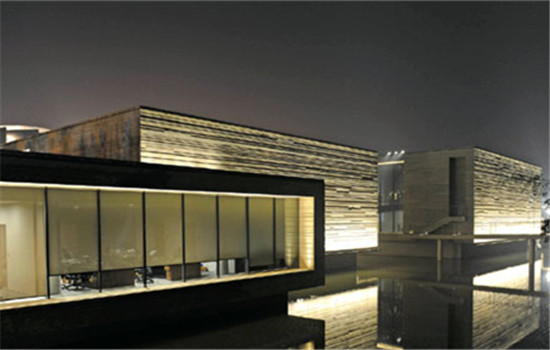
Before Mu Xin passed away in 2011, he had taken a look at the museum design and said: "Ah! Wind, water and a bridge!" This summarizes the core design concept of the building and its surroundings in his hometown. "Bridging" is the very metaphor that vividly depicts his devotion to the integration of cultural elements of Asia and the West. (Photos Provided To China Daily)
Museum for Mu Xin showcases his writings, art and fiery passion
Sitting quietly on the Yuanbao Lake inside Wuzhen's Xizha scenic area, the modern, wood-colored Mu Xin Art Museum blends surprisingly well with the generally touristy area in ancient Chinese style.[Special coverage]
Across the lake, Wuzhen Grand Theater stands tall, facing the museum. Its elliptical design forms a sharp contrast with the hard straight lines of the museum, as if the theater held all the passion of acting, while the museum housed the sober and quiet soul of painter, musician and writer Mu Xin.
Mu Xin ("heart of wood"), whose original name was Sun Pu, was born in Wuzhen town in 1927. He and writer Mao Dun grew up in the same street in Wuzhen's Dongzha (east side). Young Mu Xin often went to Mao's home to read his collection of foreign books.
A skilled artist, Mu Xin graduated from Shanghai Academy of Fine Arts, majoring in Western painting.
Since the age 14, he had been writing stories. By 1970, when all his works were taken away and destroyed during the "cultural revolution" (1966-76), he had finished more than 100 short stories and eight novella collections.
In 1968, Mu Xin was sentenced to jail for his outspokenness. He was not released until 1979. During the 12 years in jail, he saved 66 pages of paper from when he was asked to write confessions. Front and back, the pages are crammed with his written characters. The 132 pages have become his famous "manuscripts in jail".
Mu Xin wrote about Shakespeare, Tolstoy and Chopin in jail, trying to prove he was still living.
About two years after he was set free, Mu Xin moved to New York. In 1984, Unitas monthly in Taiwan published a special issue on him, who immediately became popular on the island. Twenty-two years later at the age of 79, Mu Xin went back to his hometown and spent the last five years at the renovated house of his family. Also in that year, his works were published in the mainland for the first time, and he enjoyed an avid following among young readers.


















































